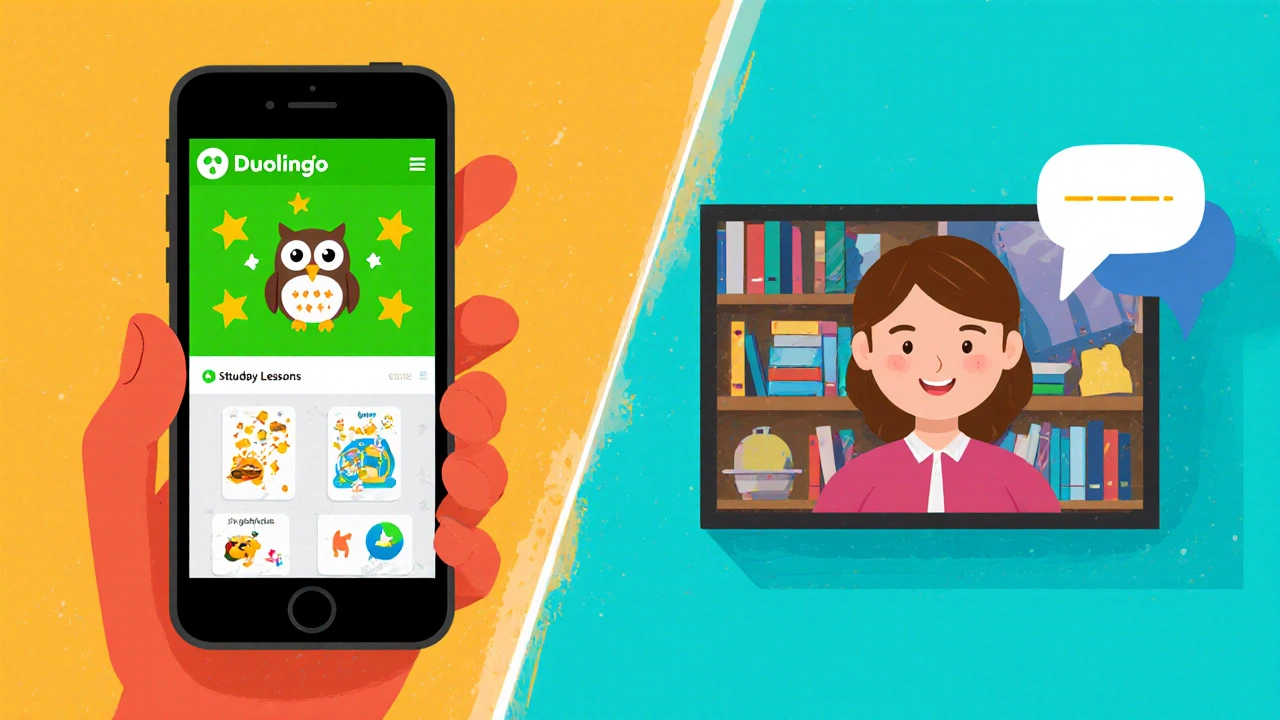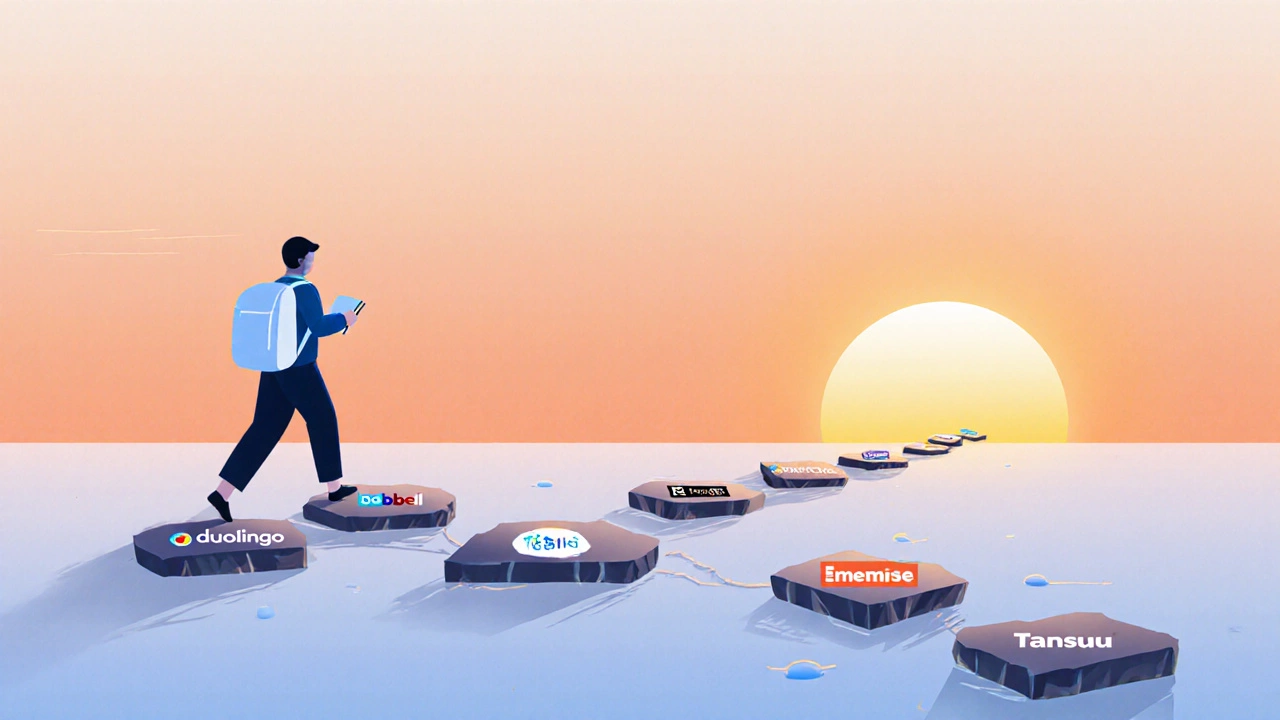English Learning App Recommender
Find Your Perfect English Learning App
Answer three quick questions to get personalized recommendations based on your goals, available time, and budget.
Looking for the best tool to learn English can feel overwhelming. Between free apps, paid courses, and live tutors, you’re not sure what will actually improve your speaking, listening, and confidence. This guide cuts through the noise, explains how to match a tool to your goals, and lists the most effective options for 2025.
Key Takeaways
- Pick a tool that matches your learning style: gamified apps for daily practice, live tutoring for speaking, or structured courses for exam prep.
- All top tools offer free trials, so test at least two before committing.
- Combine a mobile app with a conversation partner for the fastest fluency gains.
- Watch out for hidden costs like premium subscriptions or extra lesson fees.
- Set measurable milestones (e.g., 50 new words per week) to stay motivated.
How to Choose the Right Tool for You
Before diving into specific platforms, answer three simple questions:
- What’s your primary goal? Are you aiming for casual conversation, academic exams, or professional communication?
- How much time can you dedicate each day? Some apps thrive on five‑minute sessions, while tutoring needs 30‑minute blocks.
- What budget are you comfortable with? Free tools are great for beginners, but paid options often deliver faster speaking improvements.
Once you have clear answers, you can align them with the strengths of each tool described below.
Overview of the Top English Learning Tools (2025)
Duolingo
When it comes to affordable, gamified practice, Duolingo is a free language‑learning app that uses bite‑size lessons and a points system to keep learners motivated. Its strengths are daily streaks, instant feedback, and a vibrant community. The downside? Limited speaking depth - it’s best paired with a conversation app later on.
Babbel
Babbel offers structured dialogues and real‑world vocabulary tailored for adult learners. Lessons are 10‑15 minutes, so they fit into a coffee break. Compared with Duolingo, Babbel provides more detailed grammar explanations, making it ideal for learners who want a solid foundation before speaking.
Rosetta Stone
For an immersive experience, Rosetta Stone focuses on visual‑only learning, mimicking the way children acquire language. Its speech‑recognition engine has improved dramatically, giving precise pronunciation feedback. It’s pricey, but the subscription includes a 24‑month access plan that suits long‑term students.
BBC Learning English
BBC Learning English provides free audio, video, and article resources created by professional journalists. The content focuses on real‑world news and everyday expressions, perfect for intermediate learners who need authentic listening material.
italki
If speaking with a native teacher is your priority, italki connects students with qualified tutors for one‑on‑one video lessons, priced per hour. You can choose a teacher based on accent, specialization, or teaching style, making it the most flexible live‑tutoring platform.
EF English Live
EF English Live offers 24/7 group classes, a personal coach, and a massive library of interactive lessons. The platform is geared toward business professionals and exam takers, with built‑in progress tracking.
Memrise
For vocabulary‑heavy learners, Memrise uses spaced‑repetition flashcards combined with video clips of native speakers. The playful interface makes memorizing idioms and slang enjoyable.
Tandem
When you want to practice speaking for free, Tandem pairs you with language‑exchange partners worldwide, enabling text, voice, and video chats at no cost.
Busuu
Busuu combines AI‑driven feedback with community corrections on writing and speaking exercises. Its premium plan unlocks offline mode and personalized study plans.

Comparison Table - Features, Price, and Ideal Users
| Tool | Primary Focus | Free Tier | Premium Cost (per month) | Best For |
|---|---|---|---|---|
| Duolingo | Gamified daily practice | Yes (ads) | $6.99 (Ad‑free) | Beginners who need habit building |
| Babbel | Structured dialogues | No | $12.95 | Adults seeking grammar depth |
| Rosetta Stone | Immersive visual learning | No | $19.99 | Long‑term learners wanting pronunciation precision |
| BBC Learning English | Authentic news & listening | Yes | Free | Intermediate learners needing real‑world content |
| italki | One‑on‑one tutoring | Yes (trial lessons) | $15‑$35 per hour | Speak‑heavy learners needing personalized feedback |
| EF English Live | Business & exam prep | No | $49 | Professionals & exam candidates |
| Memrise | Vocabulary with video clips | Yes (limited decks) | $9 | Learners who love visual memorization |
| Tandem | Language exchange | Yes | $6.99 (Premium) | Budget‑savvy speakers who want real conversation |
| Busuu | AI feedback + community | Yes (basic) | $9.99 | Learners who like blended AI‑human correction |
Sample 8‑Week Learning Plan Using Two Tools
Most learners see the biggest boost when they combine a self‑paced app with live conversation. Here’s a practical schedule that merges Duolingo for daily vocab and italki for weekly speaking practice.
- Weeks1‑2: Complete one Duolingo “Skill” per day (≈10minutes). Schedule a 30‑minute italki trial lesson to assess your baseline pronunciation.
- Weeks3‑4: Increase Duolingo streak to two skills per day. Add a 45‑minute weekly italki session focusing on the topics you covered (e.g., ordering food, travel).
- Weeks5‑6: Introduce Babbel’s “Grammar Foundations” module twice a week for deeper structure. Keep the Duolingo streak and continue weekly speaking.
- Weeks7‑8: Switch one Duolingo session to Memrise’s “Idioms” deck to sound more native. End the program with a mock test on EF English Live to gauge progress.
Track your metrics: new words learned, pronunciation score (Duolingo’s speaking test), and confidence rating after each italki call. Adjust the mix if you notice plateaus.

Common Pitfalls & Pro Tips
Pitfall 1 - Relying on one tool only. No single app covers every skill. Pair a listening‑focused resource (BBC) with a speaking platform (italki).
Pitfall 2 - Skipping regular speaking. Even the best vocabulary won’t translate without practice. Schedule at least one live conversation per week.
Pro Tip - Use spaced repetition. Export your Duolingo word list to Anki or Memrise to reinforce retention.
Pro Tip - Record yourself. Brief daily recordings let you compare pronunciation over time and catch subtle errors.
Frequently Asked Questions
Is a free app enough to become fluent?
Free apps like Duolingo are great for building a daily habit and basic vocab, but fluency requires consistent speaking practice. Pair a free app with a conversation partner (Tandem) or a paid tutor (italki) for the missing oral component.
How much should I budget for a good English learning tool?
You can get solid progress for under $10/month using a mix of free resources (BBC, Tandem) and a low‑cost tutoring hour on italki ($15‑$20). Premium platforms like EF English Live cost more but include structured curriculum and coaching, which may justify the higher price for exam prep.
Do I need a stable internet connection for all these tools?
Most apps cache lessons for offline use (Duolingo, Busuu). Live tutoring (italki, EF English Live) does require a stable connection, but you can schedule sessions for times when your internet is reliable.
Which tool is best for business English?
EF English Live specializes in corporate English, offering industry‑specific modules, presentations practice, and a personal coach. For a lighter budget, combine Babbel’s advanced dialogues with occasional italki sessions focused on business topics.
Can I learn English without any paid subscription?
Yes. Combine free resources: Duolingo for daily vocab, BBC Learning English for listening, and Tandem for speaking practice. The trade‑off is slower progress and less personalized feedback, but consistency can still get you to a comfortable conversational level.
With the right mix of tools, clear goals, and a realistic schedule, you’ll find a learning pathway that fits your life and budget. Start with a free trial, track your progress, and upgrade only when you see measurable improvement.





Write a comment